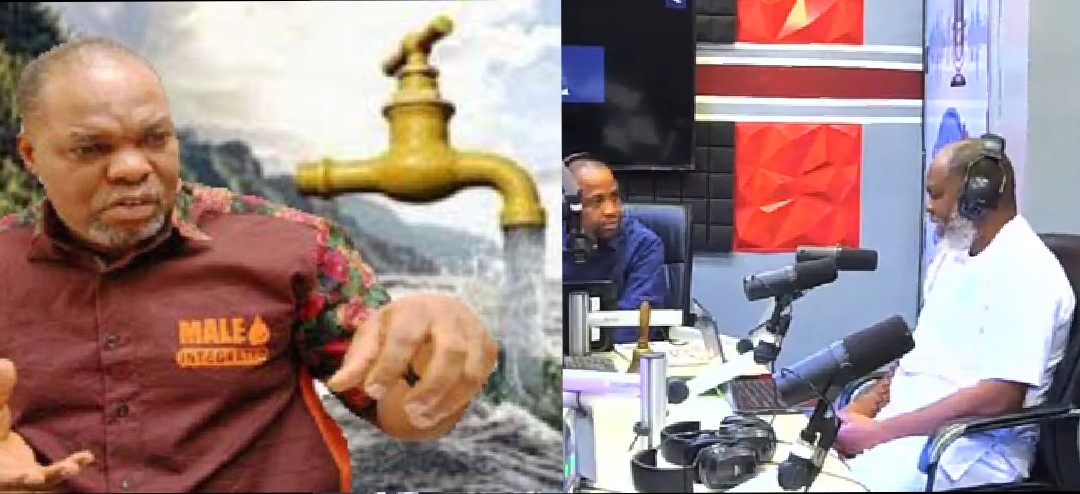
•Bill is controversial because people believe it undermines the principle of Federalism- Professor Olatunbosun
The National President of Association Of Water Well Drilling Rig Owners Practitioners (AWDROP), Michael Ale has stated that the 2020 National Water Resources bill will favour mostly people in the southern region of the country.
According to him, if this bill is not passed into law, it may result to interstate boundary dispute which can even lead to war as it happened in some countries.
Ale, who doubles as the founder and CEO of Global Initiative for Nigeria Development (GIND) Development Nigeria stated this in Ibadan on Saturday during Splash FM program by Edmund Obilo titled “State Affairs”.
Recalled that the bill seeking to regulate water resources has generated criticism, with many, including Wole Soyinka, Nobel Laureate, Benue State Governor. Dr. Samuel Loraer Ortom and others kicking against it.
The proposed law was first introduced in the eighth national assembly but it was not passed at the time after it was trailed with controversies.
In July, the bill was reintroduced as an executive bill in the house of representatives and subsequently passed. The bill is currently awaiting concurrence by the senate.
Ale while speaking during the radio program said the people in this region will suffer because their area is at the downstream and if states which are at upstream should dam their Rivers, it will affect them and therefore may cause water boundary conflict.
In his analysis during the radio program, Ale who said Southern legislators are the ones leading the agitation to stop the bill said the bill contains provisions that will ensure internal conflicts on water is averted in the region.
According to him, the possible sources of internal conflict on water is if, an upstream state decide to dam an interstate water thereby preventing it from flowing thus affecting the downstream users.
For example, River Niger passes several states before reaching Gulf of Guinea through the Delta. “If any of the state dams it, that can trigger water conflict”. He says, this bill according to the federal government has taken this into consideration.
Ale, the water and sustainable developmental expert said the bill is good for all Nigerians saying but unfortunately, it came at the wrong time controversies are trailing some political and sociocultural and economic issues in the country.
According to him, the bill that was rejected in 2018 was 81 pages and the new one reintroduced in 2020 is 78 pages. He said this means that, government has already removed areas that was generating controversies.
He said: “I was part of those who contributed to the bill in 2016 but was rejected in 2018. Major among those that opposed the bill was Godswill Akpabio who was in PDP, the opposition political party then and the motive for its rejection was to condemn the ruling APC party. The contention he raised then that, Federal Government can’t be in control of their water resources and that Federal Government will take over the lands and would be an opportunity to adopt RUGA from the back door, is what causing controversies over the bill.
“Many critique of the Water Bill are accidental Political jobbers. They lack Professional accruement to discuss water issue. And most of our Law makers have no reason to discuss every Bill.
“Nothing new in the water Bill, most of the laws were operational since 27 years ago but not implemented.
“It is only in Nigeria we don’t have laws regulating water resources management. Unlike in the past when people enjoy potable pipe borne water, today both state and federal government don’t care about this again.
“And, the borehole drillers who are taking over are drilling indiscriminately which boils down to environmental degradation and this can cause earthquakes and other environmental hazards.
“That’s why the bill says borehole regulation is an international standard for abstraction of large volume of water. It added that ground water abstraction is an activity that has both environmental and ecological impact. The bill is therefore saying that commercial drillers must obtain license which the code of practice for water well drillers issued by the Standard Organization of Nigeria (SON) and NWRI in 2010 have already required it.
“But nothing however been done regarding compliance since. Even government don’t patronize the licensed drillers but the so-called businessmen.
“Therefore, if this bill is passed, it will put more pressure on the government. Remember when we were young, politicians did use water to canvass for votes but today, reverse is the case. All contents of the bill are already existing but have not been integrated to address problems in water resources sector.
The second guest on the program, the Vice Chancellor of Kola Daisi University and former Dean, Faculty of law, University of Ibadan, Professor Olaniyi Olatunbosun said the bill is controversial because people believe it undermines the principle of Federal System of government, saying, ” much powers have been conserved to the Federal Government which is contrary to the knowledge and understanding of federalism.
Olatunbosun noted that the essence of the bill according to the Federal Government is to amalgamate laws for efficient management of water resources.
He said: “But the contention of most critics has to do with, what actually is the responsibilities of the government, because in Nigeria, we always care about putting laws in place without caring about the foundation. For law to work, there must be enabling environment because laws don’t work in fiction, it has to do with the reality. The bill seem to be good but the government must put in place water system to maximize opportunities for the laws to thrive. And there must be robust synergy among Federal, State and Local authorities to provide basic needs for the people.
